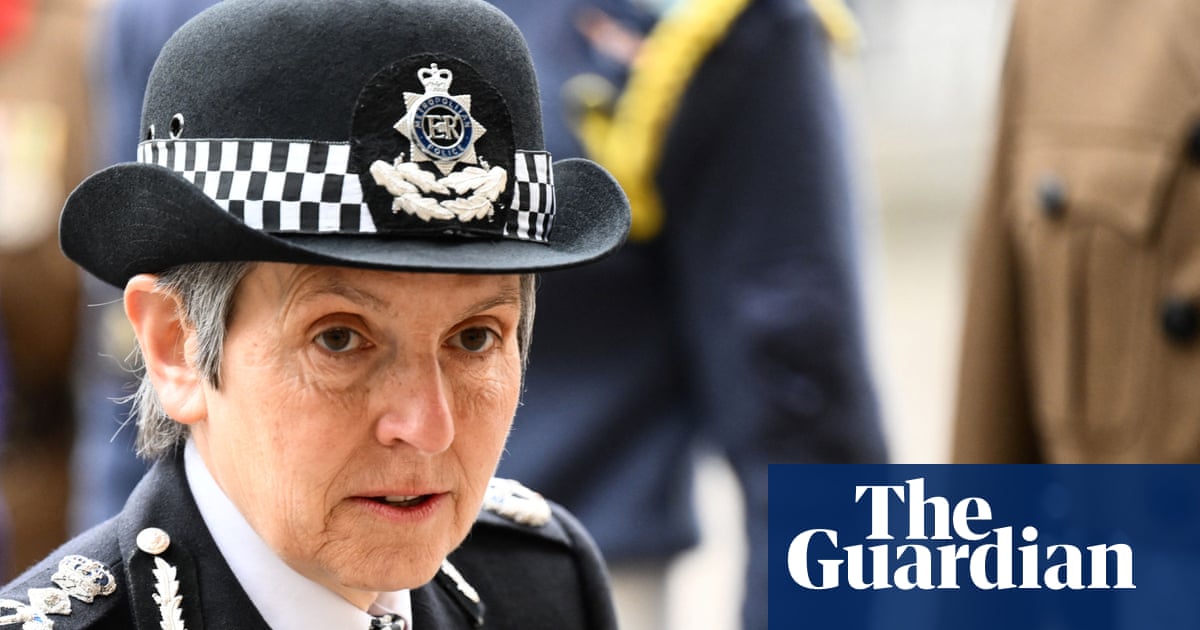
In 1955, after being presented with a damning report on corruption within the Metropolitan police, the then commissioner, Sir John Nott-Bower, went to West End Central police station, stood on a chair and reassured his officers that he did not believe a word of it. The days when a commissioner could quite so breezily dispose of criticism have long passed, as Cressida Dick learned from the many calls for her to resign before she was finally confirmed in office this month for a further two years. But how much personal responsibility should the holder of the top policing job in the country have for failings within the service they lead?
Nott-Bower came from an era when the Met was led by men – never, until Dick, by a woman – many of whom had backgrounds in the senior ranks of the armed services and when press coverage of the police was largely deferential. However, his successor, Joseph Simpson, had to deal with a public furore over a corrupt detective, Harold “Tanky” Challenor, who had planted half-bricks on demonstrators against the Greek royal family and only escaped jail on the grounds that he was mentally unfit to plead. John Waldron, who followed Simpson, was in charge in 1969 when an investigation in the Times lifted the lid on widespread corruption – he just managed to survive. His successor, Sir Robert Mark, was left with the job of, as he drily put it, “arresting more criminals than we employ”. Almost every commissioner since then has found a hand grenade left in their in-tray.
Sir Paul Condon’s tenure (1993 - 2000) was overshadowed by the murder of Stephen Lawrence and an inability to nail those responsible. During the subsequent inquiry into what had gone wrong he apologised to the Lawrences but said he would not be resigning: “I honestly believe it would be the cowardly thing to slink away at this point, or at any point.”
A total of no fewer than seven commissioners have now presided over the Met’s failure to resolve the 1987 murder of Daniel Morgan. Understandably the Morgan family were among those who, along with Lady Lawrence and victims of the grimly bungled Operation Midland enquiry into bogus claims of a VIP paedophile ring, called in an open letter last week for Dick to go.
The letter’s signatories suggested that Dick had “presided over a culture of incompetence and cover-up” and that an overhaul of the Met’s senior team was “urgent and long overdue”. These are valid points, but how easy are such overhauls? After Condon acknowledged the faults of the Met, he received this broadside from the Police Federation’s chairman: “He has told the world we’re fiddling pensions and sick leave – if that is going on it is his problem – a management problem. He has told the world that we have 250 corrupt officers yet he has done nothing to substantiate that.”
Last week’s letter also criticised the Independent Office for Police Conduct (IOPC) as “demonstrably unfit for purpose” and called for “a functional governance system … to hold the police services to account”. The sentiment is admirable, but the IOPC is the third different incarnation of a police complaints system to be created since the 1980s and still faces major criticisms. How can it be resolved speedily? Theresa May, as home secretary, tried to investigate the scandal of the Morgan case by establishing a full inquiry but it took eight years for it to return with its critical conclusions.
That inquiry, led by Baroness Nuala O’Loan, which finally reported earlier this year, criticised both Dick and one of her predecessors, Lord Stevens, who was reprimanded for his relationship with the Murdoch empire. Stevens, commissioner from 2000 to 2005, devoted a chapter of his memoir to what he described as “The Trouble with [David] Blunkett”, claiming that the then home secretary was less than supportive: “He suddenly took it upon himself to tell the Evening Standard that I had six months in which to get the level of street crime down or be replaced.”
His successor, Ian Blair, was commissioner when Jean Charles de Menezes was mistakenly shot dead by police and he was duly felled, for other reasons, by the lack of support from the then London mayor, Boris Johnson (he departed saying that “without the mayor’s backing I do not think I can continue). Blair’s successor, Sir Paul Stephenson, also faced criticism for his links to Murdoch and after two and a half years announced his departure “as a consequence of the ongoing speculation and accusations relating to the Met’s links with News International at a senior level”.
Officially, Dick enjoys the support of both the home secretary and the mayor of London, although Priti Patel’s backing is reported to be half-hearted and the two-year extension which has just been announced is said to have been granted because potential replacements are not yet deemed ready for the task.
It is not surprising that the government is happy for her to take the heat on issues of criminal justice rather than acknowledge their own catastrophic mistakes. The Met’s grant from central government fell by 29% between 2011 and 2019, leading to completely predictable shortages of personnel. The disastrous dismantlement of the probation service, when Chris Grayling was justice secretary, will take years to repair. The chaotic overcrowding of our prisons will now only be exacerbated by Patel’s determination, through the police, crime, sentencing and courts bill, to increase jail terms and criminalise everyone from troublesome demonstrators to Gypsies and Travellers.
The current aim is supposedly to appoint the next commissioner from outside the Met but interlopers are not always welcome. When Robert Mark arrived in 1972 as the “Lone Ranger of Leicester” he felt, he wrote later, “like the representative of a leper colony attending the annual garden party of a colonial governor”. Recent events indicate that the chalice offered to the garden party guest will almost certainly be poisoned.
Duncan Campbell is a freelance writer who worked for the Guardian for more than 20 years, as crime correspondent and Los Angeles correspondent












